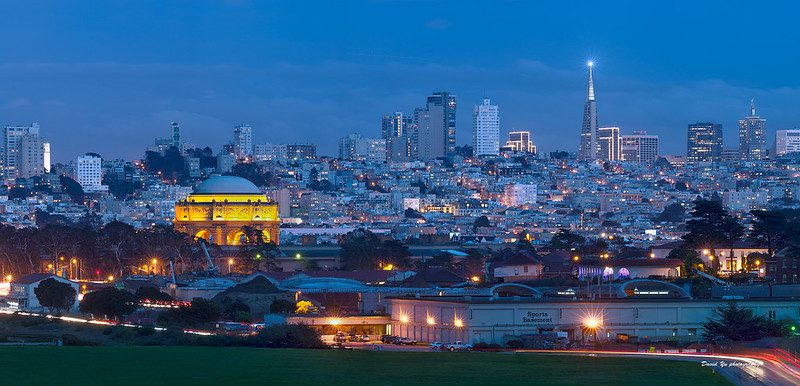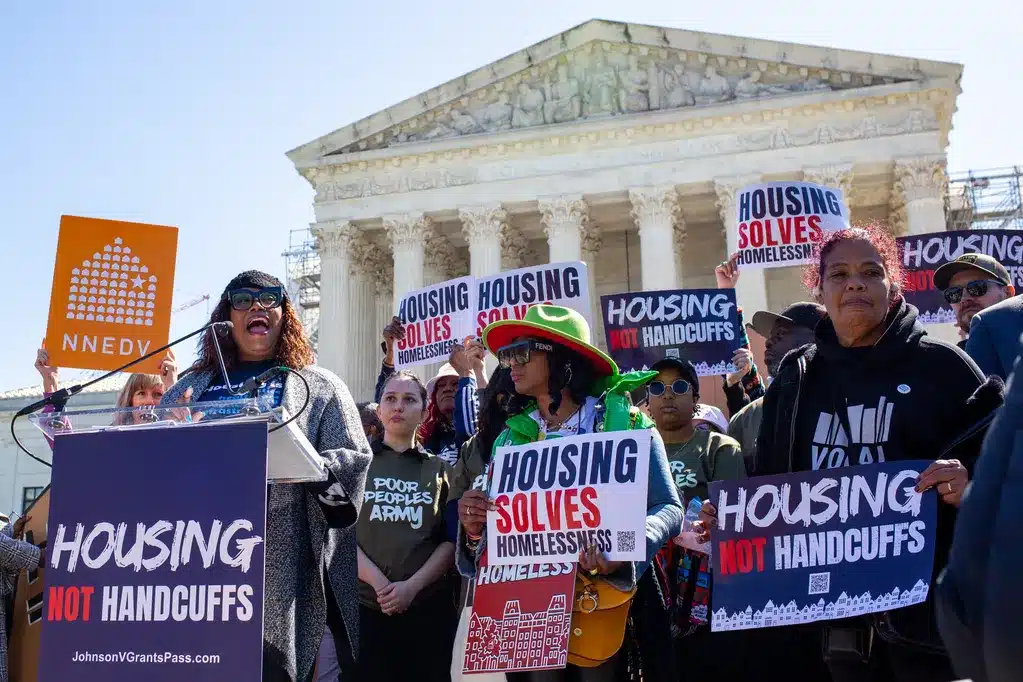
Photo by Flickr user David Yu, CC BY-NC 2.0
The city of San Francisco has been fighting a December court decision that barred it from conducting police and sanitation enforcement—or sweeps—against homeless encampments when it did not have sufficient shelter space or housing for people to move into.
In August, Gov. Gavin Newsom called the court’s ban “preposterous and inhumane,” and said it would lead to overdose deaths. And in a rally later that month ahead of a court hearing on that decision, San Francisco Mayor London Breed said, “The fact that the courts have crippled our ability to do our jobs, to help people get into shelter, is criminal.”
Yet in an Aug. 23 court hearing, attorneys representing San Francisco did not echo the claims of elected officials that the city was just trying to connect people with housing. Rather, city attorneys argued that San Francisco should be exempt from past federal court decisions and that the Ninth Circuit Court of Appeals ruling should be vacated because it was vague and left the city disempowered.
“What we didn’t see is a factual challenge of what the district court found,” says Zal Shroff, legal director for Lawyers Committee for Civil Rights for the San Francisco Bay Area, “which is that the shelter system is actually at functional capacity every day of the year.”
The political impulse to move homeless people out of view has created friction in multiple states on the West Coast and led to court decisions curbing cities’ ability to threaten, cite, or arrest people merely for being homeless. In response, states and cities have been getting wilier, searching for loopholes to avoid the injunctions, or in the case of San Francisco, arguing that the existence of shelter or housing is irrelevant to whether homeless people should face enforcement.
In December, a federal judge in Oakland ruled that San Francisco could not continue its homeless sweeps—dismantling tents and confiscating belongings—until it had an adequate number of shelter beds. The plaintiffs, which included the Coalition on Homelessness, Lawyers’ Committee for Civil Rights of the San Francisco Bay Area, and others, presented evidence that the city had been performing sweeps without attempting to offer shelter and had been tossing out people’s belongings, contrary to its own policies.
San Francisco asked the court to vacate or amend the injunction, and hearings began Aug. 23. The city’s attorneys did not contest the basic premise of the injunction, that the city has neither sufficient housing nor shelter beds. According to Shroff, the district court received data identifying more than 3,000 people who did not have access to shelter and who were nevertheless given citations or arrested during a homeless sweep. The city’s own data shows that shelters are at 90 percent capacity, with some vacancies reflecting that beds need maintenance or that they’re being held for other programs, per the Department of Homelessness and Supportive Housing website. About 4,400 people are unsheltered, and an analysis from a UCLA sociologist found that the city had only 10-50 shelter beds vacant at any given time, according to the San Francisco Chronicle.
“We are optimistic that . . . this injunction will remain,” Shroff told Next City/Shelterforce, though he acknowledged “there may be some retooling.”
San Francisco’s attorneys have argued that the availability of shelter is an unrealistic prerequisite for encampment sweeps because it would cost the city $5 billion to build out its shelter system. The city’s attorney also claimed that the injunction was vague and that it would have a “chilling effect” on any enforcement actions.
“San Francisco needs to be able to use all of the tools that state and local legislators and the voters, by initiative, have enacted,” deputy city attorney Wayne Snodgrass said at the Aug. 23 hearing. Snodgrass argued the sweeps are necessary to get unhoused people to accept housing and that they would otherwise prefer to return to the street.
Snodgrass hung on the term “involuntary homelessness,” which was used by judges in the December injunction, saying it was “vague.” Judge Patrick Bumatay of the Ninth Circuit said he didn’t understand the confusion, as the court made clear that involuntary homelessness did not include anyone offered shelter.
While elected officials were claiming they needed to perform sweeps to offer shelter, the court repeated that the city already had the right to perform sweeps if shelter was available.
“We’ve said very clearly if you have access to housing or temporary shelter you’re not involuntarily homeless,” Judge Bumatay told the city attorney.
On Sept. 5, the Ninth Circuit rejected part of the city’s bid to amend the injunction, refusing to further clarify the term “involuntarily homeless.” The Ninth Circuit wrote that “the parties agree that a person is not involuntarily homeless if they have declined a specific offer of available shelter or otherwise have access to such shelter or the means to obtain it.”
Previous Court Decisions
San Francisco attorneys also argued that the city should not be bound by two recent federal court decisions that govern how cities can address homelessness. Those court decisions include two prior Ninth Circuit decisions—Martin v. Boise, which held that the government can’t punish people for sleeping outdoors when there are no alternatives, and Johnson v. Grants Pass in 2022, which found that governments couldn’t punish people for using rudimentary shelter from the elements if they were “involuntarily homeless.” The latter decision was the first time the Ninth Circuit used that term.
Snodgrass argued that neither of those Ninth Circuit opinions should cover San Francisco, because the city has more lenient public camping laws, including multiple city ordinances that allow public sleeping for most hours of the day, as opposed to Boise and Grants Pass, the sites of the previous court decisions, which had citywide camping bans.
The plaintiffs’ attorney, Joseph Lee, said the plaintiffs had no problem with the city performing sweeps if shelter or housing is offered, but it would need to be a “real offer of shelter.”
“The factual record is that the city does not do that. Instead what the city does is things like, ‘Hey are you interested in shelter?’ without having an actual shelter offer in hand, then using that as a pretext to then enforce against that individual,” Lee told the judges.
San Francisco Violated the Injunction Anyway
“We don’t want to be in violation of any injunction,” Snodgrass said during the Aug. 23 hearing.
Yet both parties had another court date in federal district court—a level removed from the Ninth Circuit—to address the city’s noncompliance with the same injunction that the city wants vacated.
“We are in the federal district court again, where we will be enforcing the injunction that we maintain the city has actually not been complying with over the last seven months,” Shroff told Next City/Shelterforce. “The city is still dispatching officers to enforce its laws against unhoused people hundreds of times over the last several months.”
[RELATED ARTICLE: Sweeps Aren’t Outreach—Policing Homelessness Still Doesn’t Work]
In May, the plaintiffs submitted testimony from more than 20 people experiencing homelessness as well as witnesses who said police were continuing to threaten homeless people with arrest, according to the San Francisco Chronicle. Witnesses quoted a police officer as saying that he did not care about the court order.
A city attorney told the San Francisco Chronicle that “the city is complying with the preliminary injunction while simultaneously expending hundreds of millions of dollars annually to provide shelter and services to unhoused people.”
Shroff said the courts could appoint a third-party arbiter called a “special master” to conduct detailed fact-gathering on the city’s conduct in its homeless operations. Such an appointment would add an unpleasant layer of bureaucracy to the city’s efforts and produce more evidence for future court hearings, but would not necessarily curtail sweeps.
After the Hearing
San Francisco is eager to dismantle homeless encampments and will likely do so with or without the injunction, but enforcement has slowed down since the court barred the practice, and elected officials increasingly fear blowback from constituents confronted by visible homelessness.
The hearing set up a war of words between both parties after a Ninth Circuit judge asked for more information. City attorney David Chiu filed a supplemental notice—a clarifying document requested by a Ninth Circuit judge—on Aug. 29. In it, Chiu said that the plaintiffs’ attorney had made “concessions” at the Aug. 23 hearing that the city can enforce its anti-camping laws if an individual turns down a real offer of shelter. Lee, the plaintiffs’ attorney, did indeed say this, but the city interpreted this to mean that it should be free of the injunction as long as it makes any offer of shelter, whether or not there are beds available. They asked plaintiffs to agree that the injunction—and the Eighth Amendment, the basis of the injunction—should have no impact whatsoever on how the city enforces its laws.
A day after the supplemental notice was filed, the plaintiffs sent a press release calling the notice “political grandstanding intended to mislead the public.”
“Given the District Court’s findings and the acute lack of shelter, the City cannot credibly claim that it routinely makes valid shelter offers. Nothing in the preliminary injunction prevents the city from making real offers of services, routine street cleaning, or enforcing other health and safety laws,” Shroff said in the press release.
After the Sept. 5 ruling partially blocking the city’s appeal, both parties claimed victory, with city attorney David Chiu telling the San Francisco Examiner that he was “pleased” with the ruling and claiming it was a concession that the Coalition had not yet agreed to.
Shroff said that both parties had already agreed to the meaning of “involuntarily homeless” but the city was intentionally muddling the issue to suggest that many city residents are rejecting shelter.
“The city brought this motion under the guise that they actually are making shelter available,” Shroff said. “What the district court found after three years of data is that they weren’t making those shelter offers, but then even when they purported to make those shelter offers, they were making them at a time where they had absolutely no idea whether or not shelter was available that day.”
What This Means for the Future
The plaintiffs acknowledge that the injunction might be rephrased in District Court, and judges will set more specific parameters around what constitutes a real offer of shelter.
There’s also disagreement on the definition of enforcement: The city believes only an explicit request by a police officer to move can be defined as enforcement, whereas plaintiffs stated that the mere presence of many police officers at an encampment could be defined as enforcement.
Most likely, San Francisco officials, who desperately want to enforce encampment sweeps and are adamant that either building out the shelter system or building permanent housing are unrealistic, will look for loopholes that allow them to deploy police and sanitation workers to clear encampments while staying within the letter of the law. The issue is whether the courts will provide options for the city to address its lack of shelter and allow the city to enforce anti-camping laws in a more limited fashion with new guardrails.
The court drama demonstrates that the city will fight vigorously for the right to perpetually cite, arrest, and internally displace unsheltered persons. Homeless sweeps are a resource-intensive practice that don’t alleviate homelessness, but they can provide short-term political wins for politicians.
While Newsom, in his August comments, initially expressed concern for the well-being of unhoused people, he quickly pivoted to the real crisis, as he sees it.
“Ultimately, everyone’s going to blame me for everything,” Newsom said of the injunction.
This story was published through a collaboration with Shelterforce and Next City. Next City is a nonprofit news outlet that publishes solutions to the problems that oppress people in cities, inspiring social, economic, and environmental change through journalism and events around the world.





Comments